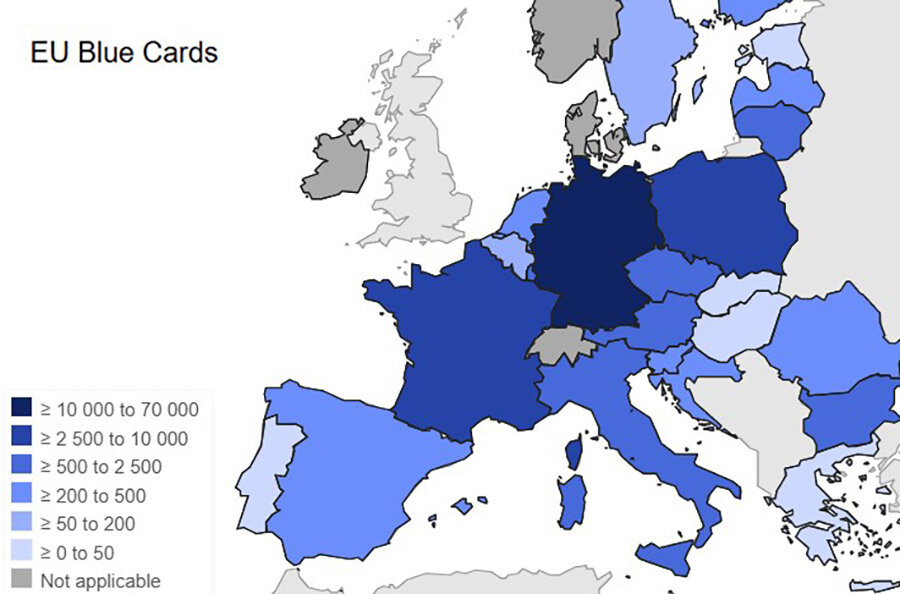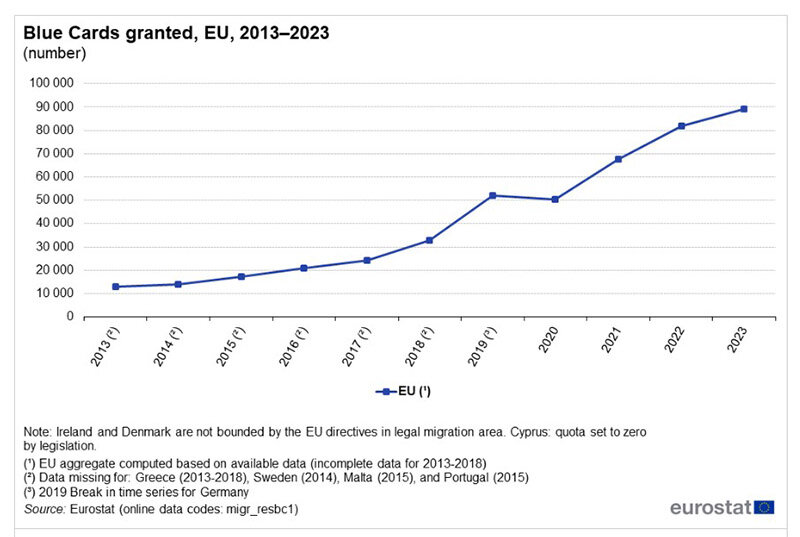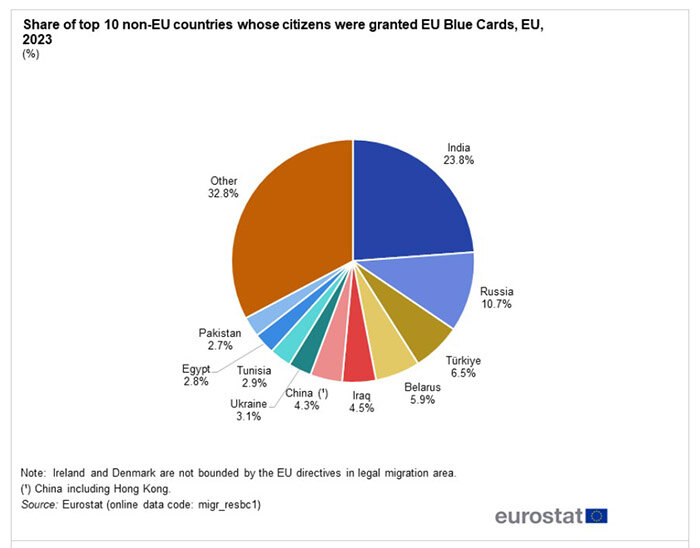EU Blue Cards: India and Russia Lead in Issuance, Germany Dominates as Issuing Country

In 2023, EU countries issued over 89,000 EU Blue Cards—residence and work permits for highly skilled professionals from non-EU countries. According to Eurostat, this instrument remains one of the key channels for attracting in-demand talent to the European labour market and plays an important role in economic development.
Dynamics of Card Issuance
Analysts note that between 2013 and 2023, the number of EU Blue Cards issued continued to rise, except for 2020, when the COVID-19 pandemic led to a 3.6% drop. In 2023, citizens from non-EU countries received a record number of Blue Cards—89,037, which is 8.8% more than in 2022 (81,846).

In 2023, Germany led in the number of cards issued, with 69,353 (85.8% of the total). Next, with a significant gap, were Poland—7,402 (9.2%), France—3,912 (4.8%), and Lithuania—1,710 (2.1%). Meanwhile, in 2023, six EU countries issued fewer than 100 EU Blue Cards, including:
Malta – 31;
Greece – 28;
Portugal – 26;
Estonia – 25;
Slovakia – 24;
Hungary – 17.
Cyprus did not issue any Blue Cards.
Ten countries accounted for over two-thirds (67.2%) of all Blue Cards issued. India ranked first among recipients, with 21,228 (23.8% of the total), followed by Russia—9,488 (10.7%), and Turkey—5,803 (6.5%). Next were Belarus—5,294 (5.9%), and Iraq—3,990 (4.5%). More than 2,000 EU Blue Cards were issued to citizens of China (3,792), Ukraine (2,743), Tunisia (2,575), Egypt (2,529), and Pakistan (2,408).

Changes in Eligibility Requirements
In recent years, EU countries have been adjusting the conditions for obtaining the EU Blue Card in line with the European Commission’s directive. In Finland, since May 2024, the salary threshold for obtaining the card was reduced from 1.5 times the average national salary (approx. €5,457/month) to one average salary (€3,638/month), while the minimum contract duration was shortened from 12 to 6 months. Additionally, applications can now be submitted not only based on higher education but also with at least five years of relevant professional experience, reports KPMG.
In Germany, according to Jobbatical, as of early 2025, a new standard salary threshold has been set at €48,300 annually. For shortage occupations (including IT and engineering), a reduced threshold of €43,759.80 applies. The minimum employment contract duration has also been shortened from 12 to 6 months. A significant innovation is that IT professionals now need only three years of professional experience, without a degree, to apply for the EU Blue Card.
In Sweden, as of January 2025, the salary threshold has been lowered from 1.5 to 1.25 times the average salary—from SEK 59,850 (€5,180) to SEK 49,875 (€4,320) per month. The minimum contract duration has been reduced from 12 to 6 months, and changing employers or professions now only requires notifying the migration agency rather than applying for a new card. Holders of EU Blue Cards from other EU countries can now apply for a Swedish Blue Card after 12 months of employment, without leaving the EU territory.
France, since May 2025, has simplified the rules for obtaining the EU Blue Card. Now, professional qualifications can be proven not only by a degree but also by at least three years of relevant work experience in the past seven years. This option will apply to a limited list of professions approved by the Council of State.
The minimum duration of employment contracts has been reduced from 12 to 6 months, making the scheme more flexible and allowing companies to hire specialists even for short-term projects. It is possible to enter France without a visa after 12 months of residence in another EU country or after 1.5 years in other non-EU states. Once in France, the application for the French Blue Card must be submitted within one month.
The validity of the Blue Card now exceeds the duration of the employment contract by three months, giving additional time to extend residency or find a new employer without losing legal status. In the five-year period required for obtaining long-term EU residence, time spent under other types of permits—such as for researchers or beneficiaries of international protection—may now be counted.
The EU Blue Card remains a crucial tool for attracting skilled professionals from outside the EU. Data for 2023 shows strong interest in the program from both applicants and European employers, especially in sectors experiencing labour shortages. Reforms, such as lowering salary thresholds, accepting work experience in lieu of academic degrees, and simplifying employer changes, make the system more flexible and accessible. These changes help the EU respond more quickly to labour market needs and enhance its attractiveness to foreign specialists. However, some countries are tightening rules—for example, the Czech Republic has raised salary requirements for applicants. It is important to stay updated on recent changes.
Подсказки: EU Blue Card, immigration, Germany, skilled workers, work visa, Europe, migration policy, labour market








